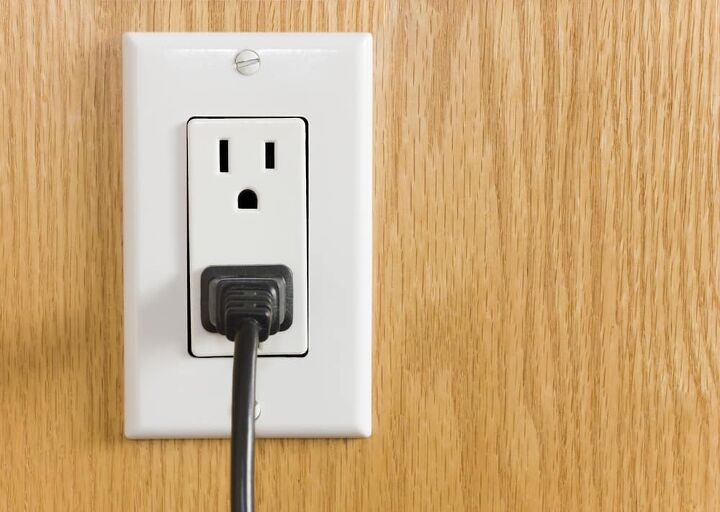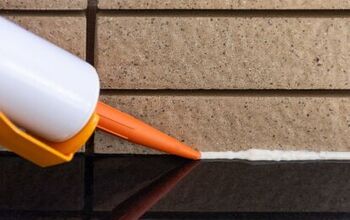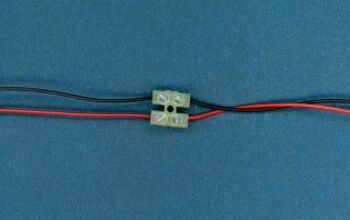Outlet Has Power But Doesn't Work? (We Have A Fix!)

Imagine the following situation: you’ve just bought a gorgeous new lamp and plug it in. The light doesn’t turn on. You know the outlet has power running to it, and that you don’t have a tripped breaker. However, the lamp isn’t working when you plug it in. You try said lamp at another outlet and it’s perfectly fine. What gives? Should you be worried?
Before you assume the outlet isn’t working, test the appliance at another location. There are several reasons why an outlet can have power but not work. The most common reasons include:
- Frayed Wires
- A Broken Connection
- Corroded Wiring
While this might seem like a minor issue, it’s really not. Depending on what’s causing it, this could be a warning sign of something far more dangerous. Let’s talk about this important issue and why you should get worried.
Do You Need to Hire an Electrician?
Get free, zero-commitment quotes from pro contractors near you.

Outlet Has Power But Doesn’t Work?
Prior to freaking out about this problem, it’s a good idea to make sure that you’re not misdiagnosing what the issue is. Here’s how to make sure that you don’t misdiagnose the problem:
- First, make sure that your circuit breaker didn’t trip. While a fuse blowing is an issue, especially if it happens a lot, it’s not what this is about. Switch the fuse or flip the switch, and you should be good to go. If it keeps happening, you might have a bad breaker.
- Try the appliance in a different plug. If it works in a different plug, it probably is the outlet. If it’s still bad, it’s a dud.
- Check to see if your home’s power is out. If the power is off, then it’s not the plug. It’s the whole house, and some lightning probably struck your wires.
- Make sure the appliance was plugged in fully. Sometimes, jiggling the plug can help.
How Common Of A Problem Is This?
Believe it or not, it’s fairly common. Most homes have at least one outlet that is wonky, so while it should be cause for concern, it’s not exceedingly rare. Thankfully in most cases, it’s a cheap and quick fix.
How Do You Troubleshoot Your Outlet?
Now that you’ve made sure that the outlet is the problem, it’s time to take a look at the outlet itself. Grab a screwdriver and a flashlight, then follow the steps below:
- Using a screwdriver, remove the wallplate from the outlet. Take a look at the outlet’s wiring, using a flashlight if necessary. Make sure to turn the switch to the power (at the breaker) off to prevent a shock.
- If you notice that some of the wires fell off the outlet, reconnect them. This denotes that the reason your outlet didn’t get power dealt with a broken connection. Reconnecting the wires that fell out of the outlet will fix the problem.
- Take a look at the wires, and search for fraying. Over time, wires will become susceptible to wear and tear. If you notice that wires are frayed, there may be a need to check the rest of the wiring in your home. If it’s a one-off, you can replace the wire yourself. Otherwise, you may need to redo the wiring in your home.
- Once fraying has been ruled out, consider calling a repairman. Another issue that could have led to this problem is wire corrosion. This means that your wiring is rusting out (either due to a leak, chemical corrosion, or other issue) and that it’s no longer conductive.
When Should You Call An Electrician?
As someone who understands why people get worried about doing their own electrical work, I totally get why a lot of people run to the electrician when they notice a problem. That’s totally fine, and if you are nervous about doing your own electrical repairs, then it makes sense to call them.
In most cases, you won’t need to do this. Just reconnecting the wires or replacing the random frayed wire is usually enough. If you see a bigger problem or signs you need a full overhaul, call an electrician.
Should You Be Worried About Frayed Wires?
This all depends. Frayed wires are always going to be problematic, and finding one might just be a one-off. Frayed wires are always a fire hazard which is why you should fix it as soon as you can. If it’s a one-off (and yes, this happens) then it’s an easy fix and you can usually get the fire danger curbed in a pinch.
How bad a sign this is depends on how the wires look and if it’s more than just one wire. The same can be said about corroded wires. Fire alone isn’t the only reason to get worried about frayed wires. If you notice any of the following, you may have a bigger problem on your hands:
- You’re seeing a lot of wires that look like they were chewed through. Yikes. Chewed through wires are usually a sign of a pest infestation behind your walls. This could be a sign that you need to give a call to the local exterminator. In most cases, the pest in question is a family of mice.
- The wires that you’re holding all feel brittle, crackly, and corroded. This is a sign that your entire electrical system might have corroded due to wear and tear. If this is the case, then you may need to get your house rewired.
- There are signs of burn marks in and around the outlet. Uh oh! This is never a good sign. This indicates that you may have had a short circuit that almost burned your house down, which is why the outlet no longer works. The wiring is totally fried. Along with calling an electrician, you probably should give your homeowners insurance company a call.
- The issue is affecting multiple outlets, not just one. A single outlet that doesn’t provide power isn’t that bad an issue in most cases. If you see two, three, or more outlets all behaving the same way, there’s an underlying problem that needs to be addressed.
- You have reason to believe that water got into your wiring. Water can cause an outlet to short out, which in turn, can lead to an inability to keep energy flowing through your home.
What Would Cause An Electrical Outlet Not To Work?
How Can You Tell If An Outlet Is Bad?
Do You Need to Hire an Electrician?
Get free, zero-commitment quotes from pro contractors near you.

Related Questions
How often should you rewire your home’s electrical grid?
Even the most well-built home will have moments where it needs to be updated. That includes the electrical wiring that runs throughout your home. Most electricians suggest rewiring the home once every 20 to 30 years, just to ensure that you have everything in working order.If your home is located in a floodplain or had something occur where there may be reason to believe wiring may have been damaged, it’s best to have an electrician look earlier than the suggested date. In some cases, you may need to have a wiring overhaul as a result of a mouse infestation or a flood.
Does homeowners insurance cover short circuits?
It depends on the reason for the short circuits. If the electrical damage is a result of neglect or foolish behavior (like trying to plug two devices in one socket and using duct tape to bind them), then it won’t cover the damage. On the other hand, if the short was caused by a random lightning strike or a flood, then chances are that you will be able to get a claim in.When considering whether or not to file a claim for a shorted outlet, it’s often best to err on the side of caution. If you have a reason to believe the claim will push through, file it. The worst that could happen is that you get a claim denied.
How much should an outlet measure on a voltmeter?
A healthy outlet will have a voltmeter reading between 110 to 120 volts. Anything lower suggests that you may have a bad breaker or a corroded wire somewhere in your home. Higher readings suggest that you may need to get an electrician to look at your wiring because it could potentially be too hot and short out in the near future.

Ossiana Tepfenhart is an expert writer, focusing on interior design and general home tips. Writing is her life, and it's what she does best. Her interests include art and real estate investments.
More by Ossiana Tepfenhart










![10 Best Electric Pressure Washers – [2022 Reviews & Guide]](https://cdn-fastly.upgradedhome.com/media/2023/07/31/9070600/10-best-electric-pressure-washers-2022-reviews-guide.jpg?size=350x220)


![Finishing Basement Without Permit [Is It Really Illegal?]](https://cdn-fastly.upgradedhome.com/media/2023/07/31/9070078/finishing-basement-without-permit-is-it-really-illegal.jpg?size=350x220)




![Standard Dining Room Table Dimensions [for 4, 6, 8, 10 and 12 People]](https://cdn-fastly.upgradedhome.com/media/2023/07/31/9074335/standard-dining-room-table-dimensions-for-4-6-8-10-and-12-people.jpg?size=350x220)








![How To Reset A Whirlpool Cabrio Washer [In 5 Easy Steps!]](https://cdn-fastly.upgradedhome.com/media/2023/07/31/9076531/how-to-reset-a-whirlpool-cabrio-washer-in-5-easy-steps.jpg?size=350x220)